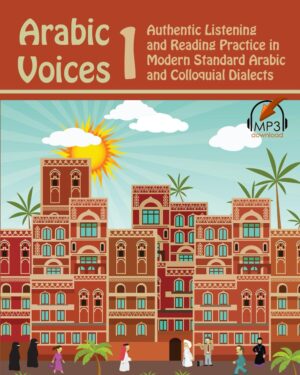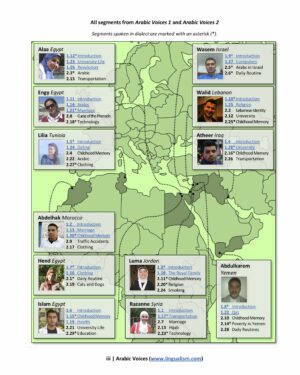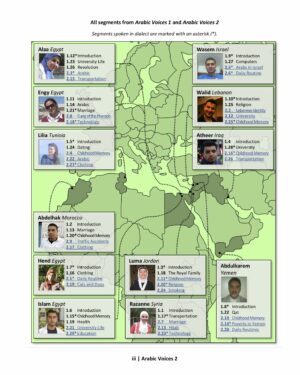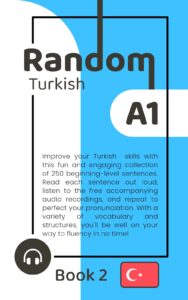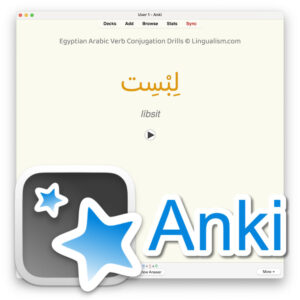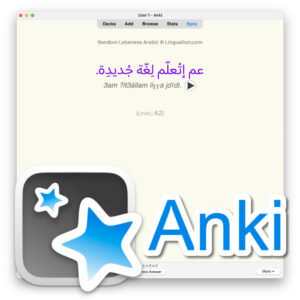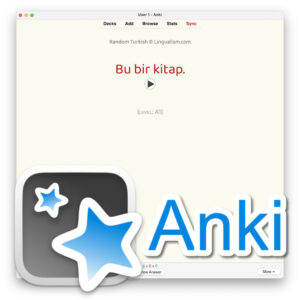Home » Modern Standard Arabic » Daily Routines–Abdulkarem
Daily Routines–Abdulkarem
| Peace, mercy and blessings of God, [00:00.2] | السلام عليكم ورحمة الله وبركاته، | |
| Hello and welcome to another Arabic Voices video on your way to learning Arabic. [00:03.1] | أهلاً ومرحبًا بكم في فيديو آخر من فيديوهات ِArabic Voices طريقك لتعلم العربية. | |
| Today we will talk about what Abdulkarem said about life in Yemen, his daily program with his family, and we will comment on the different words and phrases he used. [00:10.4] | اليوم سنتحدّث عمّا قاله عبد الكريم بشأن الحياة في اليمن، وبرنامجه اليومي مع أسرته، وسنعلّق على ما استخدمه من كلماتٍ وعباراتٍ مختلفة. | |
| We start on page 161, where Abdulkarem says on line 1: (In the life of each of us there is a specific program, which he uses from early morning until returning home in the evening). [00:26.7] | ونبدأ في الصفحة مائة وواحد وستون، حيث يقول عبد الكريم في السطر الأول: (في حياة كل إنسانٍ منّا برنامجٌ محدد، يستخدمه من الصباح الباكر حتى عودته إلى البيت في المساء). | |
| We'd like to review here quickly on something we've already mentioned, which is the use of [until]. [00:45.7] | ونودّ المراجعة هنا سريعًا على أمرٍ كنا قد ذكرناه من قبل، وهو استخدام [حتى]. | |
| It even has many uses, and one of these uses is to talk about time. [00:53.4] | فحتى لها استخدامات كثيرة، وأحد هذه الاستخدامات أن تتحدّث عن المدة الزمنية. | |
| For example, she says: (I work from morning until evening," that is, until evening; In this case… in this case you use the word [to], (I work from five to eight," and so you use [until] to talk about time. [01:02.1] | فتقول مثلًا: (أنا أعمل من الصباح حتى المساء) أي إلى المساء؛ يمكنك في هذه الح… في هذه الحالة أن تستخدم كلمة [إلى]، (أعمل من الساعة الخامسة حتى الساعة الثامنة)، وهكذا تستخدم [حتى] للحديث عن الزمن. | |
| After that, we move to line 3. Abdulkarem says: (And I go with my father to the mosque next to us, so we perform the Fajr prayer, then go home). [01:25.1] | بعد ذلك ننتقل إلى السطر الثالث—ويقول عبد الكريم: (وأذهب مع والدي إلى الجامع المجاور لنا، فنقوم بأداء صلاة الفجر، ثم نعود إلى المنزل). | |
| Here we would like to refer to the verb [to perform] or [perform], a verb that we often use with the word [prayer]. [01:38.9] | وهنا نودّ الإشارة إلى الفعل [يؤدي] أو [أداء]، وهو فعل نستخدمه كثيرًا مع كلمة [الصلاة]. | |
| We say (to perform the prayer) or (to perform the prayer," as the verb [to perform] is often used with the word prayer. [01:48.4] | نقول (يؤدي الصلاة) أو (تأدية الصلاة)، فالفعل [يؤدي] نستخدمه كثيرًا مع كلمة الصلاة. | |
| We then move to line 5, where Abdulkarem says: (This breakfast consisted of coffee and a popular dish called Al-Matayt). [01:59.5] | ننتقل بعد ذلك إلى السطر الخامس، حيث يقول عبد الكريم: (وكان هذا الفطور عبارةً عن قهوة وأكلة شعبية تسمى المطيط). | |
| Here, Abd al-Karim explains what breakfast consists of, using the phrase [is about], and we have already mentioned this before. [02:12.5] | وهنا يشرح عبد الكريم ما يتكون منه الفطور، فيستخدم عبارة [عبارة عن] وكنا قد أشرنا إلى هذا من قبل. | |
| Promise… And this phrase, when you say [is] you can use it in two cases; The first case is that you are explaining the components of an order, as he used it... as Abdelhak used Abdulkarem here... sorry... as Abdulkarem used it here, he says: (breakfast is coffee and a popular dish," and so on. [02:24.5] | وعد… وهذه العبارة، عندما تقول [عبارة عن] يمكنك أن تستخدمها في حالتين؛ الحالة الأولى هي أنك تشرح مكونات أمرٍ ما، مثلما استخدمه… مثلما استخدم عبد الحق عبد الكريم هنا… آسف… كما استخدمها عبد الكريم هنا فهو يقول: (الفطور هو عبارة عن قهوة وأكلة شعبية)، وهكذا. | |
| For example, you explain something, you say (breakfast consists of beans and cheese," and so on, you explain the ingredients of something, and in this case you can use the phrase [consists of] as well, (breakfast consists of beans and cheese," and so on. [02:51.3] | فأنت مثلًا تشرح أمر ما، تقول أن (الفطور عبارة عن فول وجبن)، وهكذا، فأنت تشرح مكونات أمرٍ ما، وفي هذه الحالة يمكنك أن تستخدم عبارة [يتكون من] كذلك، (الفطور يتكون من فول وجبن)، وهكذا. | |
| But you can also use [phrases] when defining something, say, for example: (Capitalism is about) and explain capitalism or say the definition of capitalism; These are two different uses of the word [is]. [03:09.3] | ولكن يمكنك كذلك أن تستخدم [عبارة عن] عند تعريف أمرٍ ما، تقول مثلًا: (الرأسمالية هي عبارة عن) وتشرح الرأسمالية أو تقول تعريف الرأسمالية؛ وهذين استخدامين مختلفين لكلمة [عبارة عن]. | |
| We then move to line 7, where Abdulkarem says: (I used an earthenware vessel called “cheese” for coffee). [03:31.0] | ننتقل بعد ذلك إلى السطر السابع، حيث يقول عبد الكريم: (وكنت أستخدم للقهوة إناء من الفخار يسمى "الجبنة"). | |
| Here Abd al-Karim says (pottery vessel," and you can use [from] instead of [add] with some words. [03:43.1] | وهنا يقول عبد الكريم (إناء من الفخار)، ويمكنك استخدام [من] بدلًا من [الإضافة] مع بعض الكلمات. | |
| For example, instead of saying (a cup of coffee," you can say (a cup of coffee); (cup of tea," you can say (cup of tea," instead of [add] you can use [of]. [03:54.9] | فمثلًا بدلًا أن تقول (فنجان قهوة)، يمكنك أن تقول (فنجان من القهوة)؛ (كوب شاي)، يمكنك أن تقول (كوبًا من الشاي)، فبدلًا من [الإضافة] يمكنك استخدام [من]. | |
| For example, you can say: (a dessert plate) or (a dessert plate," and so on. [04:09.3] | يمكنك أن تقول مثلًا: (طبق حلوى) أو (طبقًا من الحلوى)، وهكذا. | |
| After that, we move to line 8—Abdulkarem says: (After that I go to buy beans from the market, and the beans are being prepared and prepared in the market). [04:18.9] | بعد ذلك ننتقل إلى السطر الثامن—يقول عبد الكريم: (بعد ذلك أذهب لشراء الفول من السوق، والفول يتم تجهيزَه تجهيزُه وإعداده في السوق). | |
| We would like to refer here to the word [preparation], which is a word that we use often with food. We say: (preparing food). This is a word that we use often with different types of food. We say: [04:32.5] | ونودّ الإشارة هنا إلى كلمة [إعداد]، وهي كلمة نستخدمها كثيرًا مع الطعام، نقول: (إعداد الطعام) هذه كلمة نستخدمها كثيرًا مع أنواع الطعام المختلفة، نقول: | |
| (prepare) i.e. brings it or makes it a father… or cooks it and makes it ready to be eaten; [The food has been prepared]. [04:46.0] | (يُعِد الطعام) أي يحضره أو يجعله أب… أو يطبخه ويجعله جاهزًا للتناول؛ [أُعِد الطعام]. | |
| We then move on to line 10. Abd al-Karim says: (that is, what is equivalent to a quarter of a riyal in these days," in this sentence you can say: (that is, what is equal to these days); [Equals, equals] These days, both are true. [04:59.2] | ننتقل بعد ذلك إلى السطر العاشر. يقول عبد الكريم: (أي ما يوازي في هذه الأيام ربع ريال)، يمكنك في هذه الجملة أن تقول: (أي ما يساوي في هذه الأيام)؛ [يوازي، يساوي] في هذه الأيام، كلاهما صحيح. | |
| on line 11 we would like to point quickly to something we have already mentioned, which is how to use [after], and we said that when we use [after] we must follow it [with the infinitive], either the explicit infinitive or the responsible infinitive; (after I buy beans) or (after I buy beans," both are correct. [05:19.5] | في السطر الحادي عشر، نودّ الإشارة سريعًا إلى أمرٍ كنا قد ذكرناه من قبل، وهو كيفية استخدام [بعد]، وقلنا أننا عندما نستخدم [بعد] لا بدّ وأن نليها [بالمصدر]، سواء المصدر الصريح أو المصدر المؤول؛ (بعد أن أشتري الفول) أو (بعد شراء الفول)، كلاهما صحيح. | |
| Likewise, when we use [before], (before I buy) or (before I buy," the infinitive must be used after [after] or [before]. [05:42.2] | وكذلك عندما نستخدم [قبل]، (قبل أن أشتري) أو (قبل شراء)، لابدّ من استخدام المصدر بعد [بعد] أو [قبل]. | |
| Then we move to line 16, and on line 16—Abdulkarem says: (We spend the afternoon studying lessons, and one of the nice things is that we used to study lessons in one of the mosques near our house). [05:55.5] | وبعد ذلك ننتقل إلى السطر السادس عشر، وفي السطر السادس عشر—يقول عبد الكريم: (ونقضي فترة الظهر في مذاكرة الدروس، ومن الأشياء اللطيفة أننا كنا نذاكر الدروس في أحد المساجد القريبة من بيتنا). | |
| We quickly say here that the adjective [close] is attached to the word [from]. [06:15.3] | سريعًا نقول هنا أن صفة [قريب]، تلحقها بكلمة [من]. | |
| For example, she says: (The... the library is close to my house) or (the mosque is close to my house). [06:21.8] | فتقول مثلًا: (إن… أن المكتبة قريبة من بيتي) أو (أن المسجد قريبٌ من بيتي). | |
| [Near of] you must use [from] with [near], as opposed to [far] you use with it [from]; (far from my home) or (close to my home)... (far from my home) or (close to my home," and so on. [06:28.6] | [فقريب من] لابدّ وأن تستخدم [من] مع كلمة [قريب]، على عكس كلمة [بعيد] فأنت تستخدم معها [عن]؛ (بعيدٌ عن بيتي) أو (قريبٌ من بيتي)… (بعيدٌ عن بيتي) أو (قريبٌ من بيتي)، وهكذا. | |
| Then we move on to line 17. Abd al-Karim says: (Usually, Mosques open at prayer time," you can use the word [usually] to refer to something that happens frequently. [06:47.1] | ننتقل بعد ذلك إلى السطر السابع عشر—يقول عبد الكريم: (وعادةً، يتم فتح المساجد في وقت الصلاة)، يمكنك أن تستخدم كلمة [عادةً] للإشارة إلى أمر يحدث بصورة متكررة. | |
| You can also say [usually], (and usually, mosques are opened at prayer time). [07:02.7] | ويمكنك كذلك أن تقول [وفي العادة]، (وفي العادة، يتم فتح المساجد في وقت الصلاة). | |
| After that, we move to line 26, where Abdulkarem says: (We were also afraid that a complaint would be made to my father, and that was a situation that meant annoying to me, and I still remember it until now). [07:10.7] | بعد ذلك ننتقل إلى السطر السادس والعشرون، حيث يقول عبد الكريم: (وخُفنا أيضًا بأن يتم الشكوى إلى والدي، وكان ذلك موقف يعني مزعج بالنسبة لي، ولازلت أتذكره حتى الآن). | |
| The phrase [still] means that it continues until now, and when you use [still], you add it to [the present tense]. [07:28.0] | وعبارة [لازلت] تعني أن الأمر مستمر حتى الآن، وعندما تستخدم [لازلت]، تلحقها [بالفعل المضارع]. | |
| You say, for example: (I am still studying my lessons, I am still doing this," as you can see here you can add it to the present tense, so you say (I am still reading) meaning that you have not finished reading yet, and this is continuing until now. [07:38.1] | تقول مثلًا: (أنا لازلت أذاكر دروسي، أنا لازلت أفعل كذا)، فكما ترى هنا يمكنك أن تلحقها بالفعل المضارع، فتقول (أنا لازلت أقرأ) أي أنك لم تنتهي من القراءة بعد، وهذا أمر مستمر حتى الآن. | |
| After that, we move to line 30—and finally—we refer here to a phrase we use in the Arabic language, which is [some of]. [07:58.4] | بعد ذلك ننتقل إلى السطر الثلاثون—وأخيرًا—نشير هنا إلى عبارة نستخدمها في اللغة العربية وهي عبارة [بعض من]. | |
| Here Abdulkarem says: (These are some of the works that we do); on line 30 he says: (And these are some of the works that we do). [08:11.1] | هنا يقول عبد الكريم: (وهذه بعضًا من الأعمال التي نقوم بها)؛ في السطرالثلاثين يقول: (وهذه بعضًا من الأعمال التي نقوم بها). | |
| And you can say [some of] or just [some], both of which have the same meaning; You can say: (some of the work we do) or (some of the work we do). [08:27.8] | فيمكنك أن تقول [بعض من] أو فقط [بعض]، كلاهما بمعنا واحد؛ فيمكنك أن تقول: (بعضًا من الأعمال التي نقوم بها) أو (بعض الأعمال التي نقوم بها). | |
| You can use [some] with the word immediately following it, or you can use [of]; For example, you can say: (I met... I met some people) or (I met some people," both are correct. [08:33.7] | يمكنك أن تستخدم [بعض] مع الكلمة التي تليها مباشرةً، أو تستخدم [من]؛ فيمكنك أن تقول مثلًا: (قابلط… قابلت بعض من الناس) أو (قابلت بعض الناس)، كلاهما صحيح. | |
| And with this, we have finished commenting on what Abdulkarem said. [08:49.5] | وبهذا نكون قد انتهينا من التعليق على ما قاله عبد الكريم. | |
| I hope you have benefited from this video. [08:55.1] | أتمنى أن تكونوا قد استفدتم من هذا الفيديو. | |
| Mustafa Ahmed was with you. [08:58.2] | كان معكم مصطفى أحمد. | |
| Thank you very much. May the peace, mercy and blessings of God be upon you. [08:59.8] | أشكركم شكرًا جزيلًا، والسلام عليكم ورحمة الله وبركاته. |
Video Lessons
Arabic Voices MSA Lessons
Arabic teacher Mostafa Ahmed takes us through segments in MSA from Lingualism's book Arabic Voices 1: Authentic Listening and Reading Practice in Modern Standard Arabic and Colloquial Dialects, explaining interesting points of grammar and vocabulary.
© 2024 Lingualism LLC

